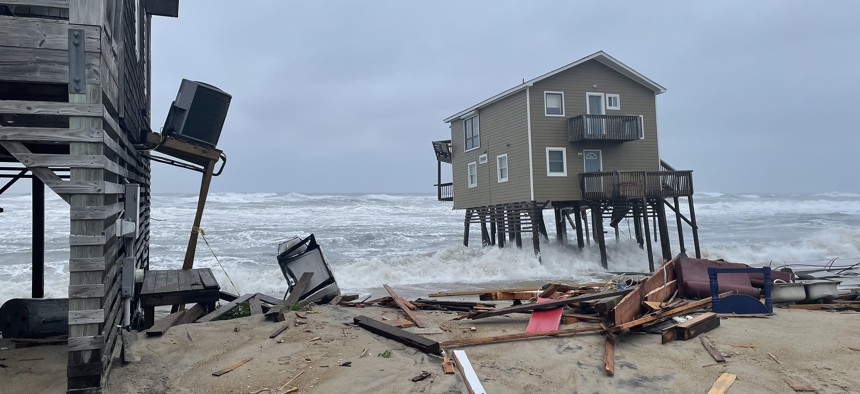North Carolina House That Collapsed Into the Sea is a Warning for Millions of Americans

Debris from a collapsed house in North Carolina's outer banks, May 10, 2022. Cape Hatteras National Seashore / NPS
States and the federal government can do more to protect homebuyers, like reforming flood disclosure laws.
This story was originally published by Grist. You can subscribe to its weekly newsletter here
Millions of Americans own homes that could flood at any moment. Many of them don’t have a clue. That’s what happened to Ralph Patricelli, a 57-year-old real estate agent who bought a house in North Carolina’s Outer Banks last summer. Last week, the four-bedroom waterfront vacation home he purchased with his sister for $550,000 was swept into the ocean. The house’s collapse was captured on video, which quickly went viral on Twitter. “I didn’t realize how vulnerable it was,” Patricelli said in an interview with the Washington Post.
Erosion, extreme weather, and sea-level rise have long threatened homes built on barrier islands like the one Patricelli’s house was located on. And yet Americans still buy homes in these areas with little to no knowledge of the risks and financial burdens they’re taking on. Studies show that 13 million Americans could become displaced by rising sea levels and $1 trillion worth of homes and commercial property could be inundated by the end of the century. Without intervention, more and more people, like Patricelli, will be left holding the deed to an empty lot or a severely damaged building. But there’s plenty that cities, states, and the federal government can do to prevent homebuyers from sinking money into properties that are destined to sink into the sea.
One major way to discourage homebuyers from buying flood-prone houses is to require sellers to disclose a property’s history of flooding to prospective buyers. But almost half of states don’t give homebuyers the right to this information. According to the Natural Resources Defense Council, 21 states have no flood disclosure requirements at all, and another five states have “inadequate” requirements.
North Carolina is one of the states with inadequate flood disclosure laws, according to the group. A state real estate commission requires sellers to tell buyers if the seller has “actual knowledge” of the property being subject to flood risk or being located in a federally-designated flood area. But the term “actual knowledge” isn’t specific enough to require a comprehensive assessment of past flooding. And the NRDC also points out that North Carolina does not require sellers to tell buyers whether or not a property must have flood insurance under federal law. Other states have a confusing bungle of disclosure requirements that result in buyers getting an incomplete picture of how risky their prospective property is.
“The deck is stacked against home buyers, leaving millions of people investing their life savings in risky properties without knowing it,” said Joel Scata, an NRDC attorney, in a statement last year. “With flood risks rising throughout the country, we need to strengthen these disclosure rules across the board.”

There’s more the federal government can do to protect homebuyers, too. The National Flood Insurance Program, which is administered by the Federal Emergency Management Administration and issues policies that are a prerequisite for most homeowners with mortgages in flood zones, recently increased premiums in certain areas to better reflect flood risk. That move could potentially help discourage people from building or buying homes in especially at-risk areas like the barrier island Patricelli’s house was built on. But FEMA could do more to ensure people have access to flood hazard information such as a property’s history of flooding before buying a home. FEMA could create an accessible database that people could use to search for a home’s flood history. The agency could also require states to pass comprehensive flood disclosure laws as a prerequisite to participating in the National Flood Insurance Program.
Ultimately, even stronger action will be needed to protect homebuyers, and people who already own homes in flood-prone areas, from sea-level rise. Managed retreat — the organized coordination of people and assets away from coastlines — could help save lives and money. But politicians aren’t ready to have that conversation yet. Managed retreat is a political hot potato — few state senators or representatives, and certainly no members of Congress, want to tell their constituents that climate change will eventually force them to leave their homes.
In the meantime, people like Patricelli will continue to be caught unawares. “I was aware that erosion was happening there,” Patricelli, who had been informed of the way the sellers of his property had tried to bolster the house against erosion, told the Washington Post. “I was not aware of the rate that it was happening.” He told the Post that he was in the midst of relocating the house further inland prior to last week’s incident. “We really thought we were going to be able to move the house and save it,” he said. Time is running out for many other Americans, too, even if they don’t know it yet.

NEXT STORY: How a Virginia county wooed Amazon and Boeing





